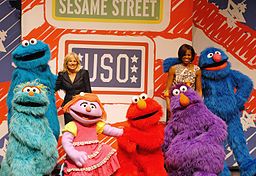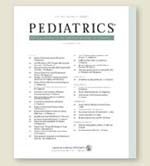Executive Function
Why Big Bird Is Better than Cartoons for Kids
An argument for continued public funding of quality television shows for kids.
Posted October 27, 2012
Feeding my three-year-old picky eater grandson becomes much easier when I let him watch a few scenes from Sesame Street while he eats. But that’s not the main reason for my defense of Big Bird and public television versus the commercial networks that one presidential candidate seems to prefer for children, in the spirit of capitalism, free enterprise, and smaller government. The main reason is that an important research study has shown that Big Bird and his Muppet friends are not harmful to children’s ability to think and focus, whereas some cartoons on commercial television stations certainly are.

I am referring to a study that was published last September in Pediatrics, the official journal of The American Academy of Pediatrics, called “The Immediate Impact of Different Types of Television on Young Children's Executive Function”
The study examines the effects of watching fast-paced cartoons on the attention span and memory of 4 year-olds. The study is personally important to me because it confirms once again what I have been telling parents of young children for two decades: "Be mindful of the quality of the television programs that your child watches. Limit TV to a maximum of one hour of PBS daily. Only allow your children to watch shows like Sesame Street and Mr. Roger's Neighborhood, and keep them away from cartoons on commercial channels."
In the study, researchers divided 60 four-year-olds into three groups. Each group was put into a room and directed to do one of the following activities: draw with crayons, watch a PBS show called Caillou, or watch a fast-paced commercial TV show called Spongebob. After 9 minutes, the children took a battery of tests that required focus, concentration, patience, working memory, and manipulation. Researchers were hoping to capture the "executive function" of a child's brain with the tests.
The results were remarkably in tune with what common sense has been telling us for years. Children who watched the fast-paced cartoons did significantly worse on the attention and memory testing than the children in the other two groups. There was no difference in performance between the educational TV (Caillou) group and the drawing group.
The researchers concluded that just nine minutes of viewing a fast-paced television cartoon had immediate negative effects on 4-year-olds' executive brain function. They issued the warning: “Parents should be aware that fast-paced television shows could at least temporarily impair young children's executive function.”
So what was it about the fast-paced show that had a negative effect on the children's brains? What the researchers concluded was that the unnatural pace of the cartoon sequences was over-stimulating and stressful to the child's brain. The human-Muppet interactions on Sesame Street are naturally paced, whereas the Sponge Bob sequences were unnaturally rapid and the overstimulation from the "surreal" pacing may have taxed the children's brains.

In an editorial in the same issue of Pediatrics, Dimitri Christakis, M.D., of Seattle Children's Hospital, says that although the study was small, it was "robust" and the results are critically important: "Connecting fast-paced television viewing to deficits in executive function, regardless of whether they are transient, has profound implications for children's cognitive and social development that need to be considered and reacted to… what makes programs good or bad has to do not only with the content itself but with what in communications research are known as the formal features of that content. Some sequences are naturally paced (eg, human-Muppet interactions on SesameStreet), and some are rapid (eg, SpongeBob SquarePants). Others occur in what seems like slow motion (eg, Mr. Roger’s Neighborhood).”
What does this study mean for parents who want to avoid having the executive function of their children's brains impaired by television shows? It speaks to the importance of focusing on the quality of television shows that they allow their children to watch. The study strongly argues that parents should not allow kids to watch cartoons that are unnaturally fast-paced—the kind of cartoons that are to be found on commercial television. If parents do not want to stress their children's brains, they might want to stick to PBS and avoid the fast-paced cartoons on commercial stations—and hope that public support for safe, wholesome children's programming continues.


